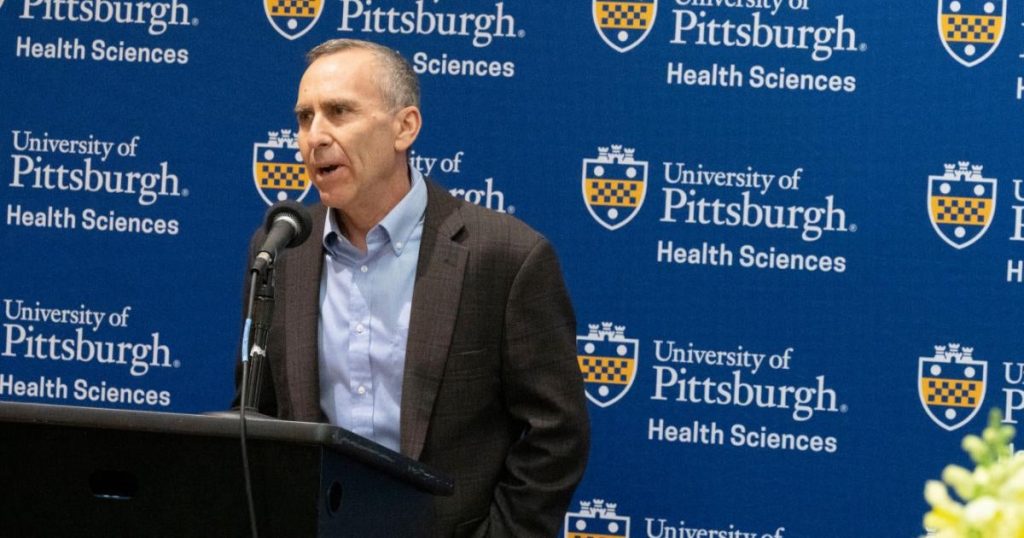Pitt is launching an Office of Sustainability in the Health Sciences
4 min read
Students come out of Pitt’s health science programs knowing how to care for their patients. A new effort will ensure they emerge knowing how to care for the planet, too. In conjunction with Earth Day 2024, University of Pittsburgh officials announced the opening of a new Office of Sustainability in the Health Sciences.
“Given that health care and associated research are responsible for approximately 10% of U.S. greenhouse gas emissions and represent the second-largest industry contributing to landfill waste worldwide, it’s imperative that we increase education, awareness and implementation of environmentally sustainable measures across all our mission areas,” said Anantha Shekhar, senior vice chancellor for the health sciences and John and Gertrude Petersen Dean of the School of Medicine.
“In addition to collaborating with the curriculum committee to offer a combination of coursework and experiential learning related to sustainability, this office will lead efforts to generate increased funding for sustainability research and interface with Pitt and community partners focused on environmental justice and dismantling climate change-related health inequities.”
The new office will oversee sustainability efforts in Pitt’s six schools of the Health Sciences, led by Michael Boninger (pictured above), a School of Medicine professor who also serves as associate dean for sustainability for the school and chief medical sustainability officer at UPMC, among other appointments across the teaching-hospital system and the University. The office’s assistant dean is Noe Woods, a School of Medicine assistant professor and chair of Clinicians for Climate Action.
[Read more in Pitt Med magazine: Greening the med school.]
Partnering with the University of Pittsburgh’s Office of Sustainability and the UPMC Center for Sustainability, the new office will represent both the University and the teaching-hospital system in the National Academy of Medicine’s prestigious Climate Collaborative. This reinforces Pitt’s commitments to reducing greenhouse gas emissions and creating climate-resilient infrastructure, while incorporating sustainability into health sciences education. Other higher-education members include NYU Langone Health and the universities of California and Michigan.
Beyond the National Academy of Medicine’s Climate Collaborative, the Pitt office also will play a role new to the University: In coordination with the Office of Sustainability in the Health Sciences, the School of Public Health will be part of a novel Pennsylvania One Health consortium, serving as the coordinating academic institution of a group that includes Penn State and the University of Pennsylvania. One Health is a national Centers for Disease Control and Prevention effort that collaborates with state agencies and community leaders to address One Health initiatives through a transdisciplinary portfolio of research, education and community outreach across Pennsylvania.
“The new Office of Sustainability will accelerate the transdisciplinary opportunities across the health sciences,” said Maureen Lichtveld, dean of the School of Public Health.
The University has robust sustainability and climate action plans, including pursuing carbon neutrality by 2037. As part of the Earth Day event, Aurora Sharrard, Pitt’s assistant vice chancellor for sustainability, announced that solar panels will be placed on the roof of Alan Magee Scaife Hall, home to the School of Medicine, in the next year.
“It will generate electricity equivalent to that used by 23 homes annually,” she said during the event. “Rooftop solar on Scaife Hall and two other health sciences buildings currently under construction will also help the University further reduce global and local air pollutants and improve their cascading health benefits.”
The establishment of this office for the schools of the health sciences and medicine deepens Pitt’s commitment to balancing equity, environment and economics so current and future generations can thrive.
“From medical to pharmacy to athletic training, our students want to learn more about practicing and living more sustainably,” Boninger said. “Our office will work to incorporate sustainability throughout the health science curriculums and offer new hands-on interdisciplinary opportunities to learn.”
Just over a year into its existence, the UPMC Center for Sustainability has made tremendous progress thanks to a broad range of ideas being generated by staff members and leaders in nearly every department. One example: The hospital system eliminated the use of desflurane, a greenhouse gas commonly used as a general anesthetic to help patients achieve a deep sleep for surgery. UPMC introduced alternative intravenous medications and inhaled gases that are safe and effective as well as more environmentally friendly.
Boninger said UPMC’s clinicians and staff are working hard to decrease the environmental impact of a network that includes 40 hospitals and hundreds of outpatient sites and offices.
“The goal of this office is to graduate students with the ecoliteracy, expansive thinking and passion needed to fundamentally rethink the way we practice medicine,” Woods said. “We have to build a health care system that highly values the legacy it creates for the environment. We need to nurture the planet, just like we nurture our patients.”
“With the University of Pittsburgh’s sustainability timeline stretching back over three decades, we are truly on a journey to embed sustainability throughout the University,” said Sharrard. “Today’s new, deeper commitment by the schools of health sciences is an important milestone in the ongoing expansion of University-wide sustainability strategy, activities and partnerships both academically and operationally. We are excited for Pitt Health Sciences to further advance Pitt’s sustainability efforts by embedding sustainability into research, the curriculum and the built environment.”
— Chuck Finder, photography by Tom Altany
link





